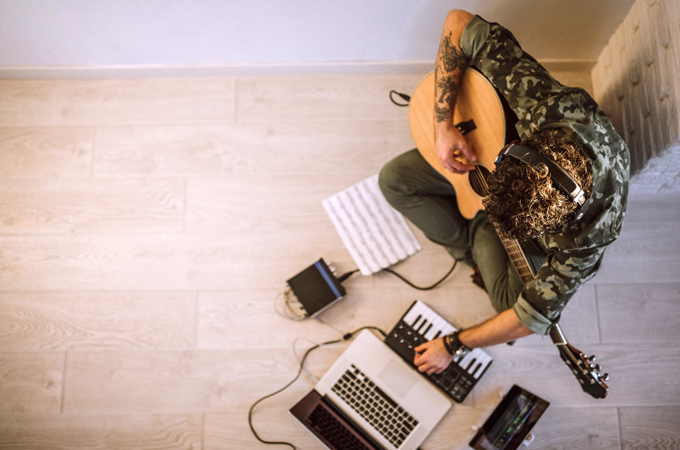Joseph Modica, director of the School of Music, said when he interviewed for his position last year, one of the questions he was asked was about the challenges of the 21st-century musician.
“And here we are, we’re experiencing them!” he says of teaching and performing music during the pandemic.
While both students and faculty members in the School of Music have mixed feelings about not being on campus this fall, they are rising to the challenge. “[Live performance] is what we work towards—the feeling of getting in front of a live audience and performing, so that’s a loss,” Modica said. “At the same time, students have been appreciative of the ways we’re trying to move forward. I love the attitude I see here in the School of Music and across campus. People making it happen.”
Embracing opportunity with technology
Modica sees the challenges of a virtual fall semester as an opportunity for students and teachers to learn the technology they’ll need to succeed: “We are experimenting with different online platforms to help the rehearsal experience be something valuable to the students, and we’re getting creative and innovative using multimedia.”
The school has also invested in microphones and other equipment to loan out to students for the best possible experience at home, made possible through a gift from the Frederick Loewe Foundation.
Alexia Benson ’21, a music composition and vocal performance major, says she and her peers are learning how to use technology as a means to market themselves as musicians, gain publicity for their work, and share experiences in the best possible way. “Editing videos and audio might become the new norm for musicians in this upcoming year as the main medium to present our work,” Benson said.
Virtual performances—including a piano showcase, choir concerts, and ensemble concerts—are planned. New camera equipment and sound system equipment in the Frederick Loewe Performance Hall now allows for live streaming of student recitals. A new streaming camera has been installed at the Memorial Chapel as well, Modica said, which will be of future use to many departments and groups.
Reimagining performance
Anthony Suter, associate director of the School of Music, is one of the people making it happen in his composition course.
“We are focusing our efforts on reimagining what ‘performance’ looks and sounds like,” he said. “The students in the Composition Studio will be exploring new media and arenas for sharing their incredible work through digital media, video, remote recording, various resources for electronic and computer music, and a host of yet-unimagined techniques and ideas they will undoubtedly invent.
“We are thinking very intently about composing for these new media situations; as composers, we are very much useful and needed in this contemporary moment,” he continued. “We are undertaking collaborative projects with performers that are imagined ‘from the ground up’ as pieces whose performances will take place in digital space—live-streamed, recordings, Facebook, YouTube, TikTok—anywhere but the normative ‘concert hall experience.’ This is not a translation of a traditional piece to a new medium, but a wholesale creation for the new medium of choice.”
Suter said he has one student writing a piece for the Chapel Singers group this term, and her process is to write an individual part for each singer, which each singer will then record solo. Once she has all of the individual recordings, she will assemble the piece in digital audio software to complete the final version of the work. Other student projects involve animation, collaborating with student animators to create a short film.
“Anticipating that our eventual return to in-person music-making will likely necessitate social distancing, several students are working on pieces for the future that utilize space and distance as integral parts of the musical canvas,” Suter said. “This is all to say that we view the current situation as an opportunity to challenge some foundational assumptions about the nature of performance, audience, and purpose—which is exciting and interesting work to be doing.
It is important for us to be able to look back on this time and say that we did interesting work that met the challenge of the moment.”
Learn more about the School of Music.






